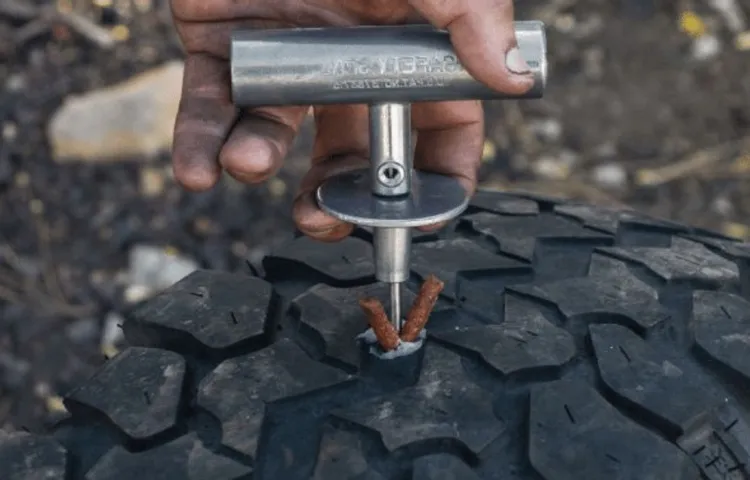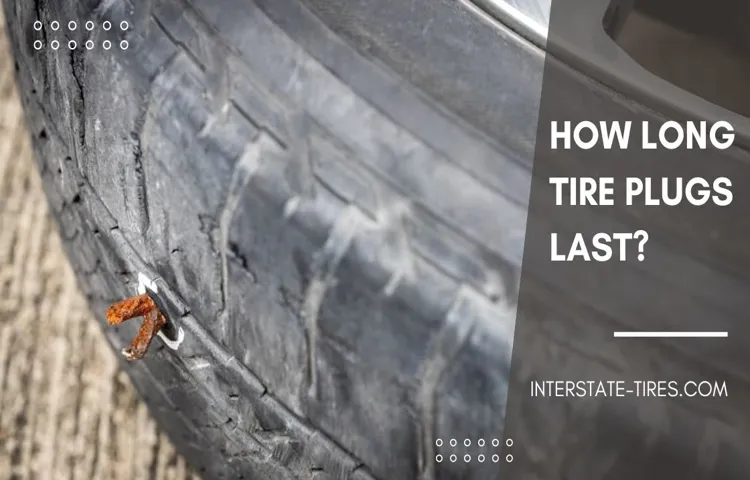When you experience a tire puncture, it can be tempting to replace the entire tire. However, this can be costly and unnecessary in most cases. So, what are your options? Tire plugs offer a quick and affordable solution for fixing small punctures in your tire.
But how long can a tire plug really last? It’s a valid question, as no one wants to be left stranded on the side of the road with a flat tire again soon after the plug. In this blog post, we’ll explore the durability of tire plugs, factors that can affect their lifespan, and how to ensure their longevity. So, whether you’re an experienced driver or new to car ownership, keep reading to learn everything you need to know about tire plugs and their lifespan.
Table of Contents
What is a Tire Plug?
So, what is a tire plug and how long can it last? Well, a tire plug is a quick and easy solution used to repair a punctured tire. It involves inserting a small, sticky, rubber plug into the hole where the air is escaping. The plug then expands and creates an airtight seal, allowing the tire to hold its pressure.
Typically, a tire plug can last for anywhere between 6 to 12 months, depending on the size and location of the puncture, the quality of the plug, and the conditions in which the tire is used. It’s important to note that a tire plug is meant to be a temporary fix and should never be considered a permanent solution. It’s always best to have your tires inspected by a professional mechanic to determine the extent of the damage and whether or not a replacement is necessary.
So, if you find yourself with a flat tire, a tire plug can definitely come in handy, but be sure to get it checked out by an expert to ensure your safety on the road.
Definition and Procedure
A tire plug is a quick and easy way to repair a small puncture in a vehicle tire. This is a temporary fix that can be done without removing the tire, making it a convenient solution when you are on the go. The procedure involves locating the puncture, usually by spraying soapy water on the tire and looking for bubbles, inserting a plug into the hole with a special tool, and trimming off the excess plug.
The plug is made of a flexible material that will conform to the shape of the puncture and provide a seal against air loss. While a tire plug is a simple and effective solution for minor damage, it is important to note that it is not a permanent fix and should be used as a temporary measure until you can have the tire professionally repaired or replaced. Additionally, a tire plug is only suitable for small punctures that are on the tread of the tire and not on the sidewall.
In summary, a tire plug can be a lifesaver when you experience a puncture on the road, but it should not be considered a long-term solution.

Factors that Affect the Lifespan of a Tire Plug
When it comes to how long a tire plug can last, several factors come into play. The first is the type of tire plug used, as some are designed for short-term repairs while others are meant for long-term use. Additionally, the location of the puncture can impact the lifespan of a tire plug.
For example, if the puncture is in the sidewall or shoulder of the tire, the plug may not be able to hold as well as it would in the tread area. The condition of the tire itself also matters, as older tires with more wear and tear may not be able to support a tire plug as effectively as newer, more supple tires. Finally, climate and driving conditions can also impact how long a tire plug lasts.
Extreme heat or cold can cause the tire plug to deteriorate more quickly, while rough terrain or high speeds can put more stress on the plug, reducing its lifespan. Ultimately, the longevity of a tire plug depends on a range of factors, and it is important to monitor the plug and replace it as needed to ensure optimal safety on the road.
Tire Age, Type or Size, and Plug Positioning
A tire plug is a simple yet effective solution to fixing a punctured tire. However, several factors can affect the lifespan of a tire plug. First and foremost, the age of the tire is crucial.
A tire that’s too old can compromise the integrity of the plug, leading to leaks or even blowouts. The type or size of the tire can also play a role. For instance, a plug that works well on a passenger car tire may not be suitable for a larger vehicle, such as a truck or SUV.
Additionally, the positioning of the plug matters. A plug positioned too close to the sidewall or tread edge may not hold up as well as one closer to the center of the tire. Overall, tire plugs can be a lifesaver when you’re in a pinch, but it’s essential to make sure you’re using the right plug for your tire and that it’s installed correctly to ensure its longevity.
Signs that a Tire Plug Needs Replacement
If you’ve recently had your tire patched with a plug, you may be wondering how long it can last before needing a replacement. While tire plugs can be a quick and inexpensive fix for a small puncture, they may not be a permanent solution. Signs that it may be time to replace the plug include a loss of air pressure in the tire, visible damage to the plug itself, or a bulging or uneven tire tread.
It is also important to note that tire plugs should only be used for small punctures in the tread of the tire and not for damage near the sidewall or shoulder. Ultimately, it is best to have a professional inspect your tire to determine if a replacement plug or a new tire is necessary for optimal safety and performance on the road.
Tread Wear, Air Pressure Loss, and Visual Damage
When it comes to maintaining your tires, it’s important to keep an eye out for any signs of wear and tear. One of the most common indications that your tire plug needs replacing is tread wear. As your tire’s tread wears down, its ability to grip the road diminishes, which can increase the risk of hydroplaning and reduced braking performance.
Another sign that a tire plug may need replacing is air pressure loss. If you find yourself regularly having to top up your tire’s air pressure, it could be a sign of a slow leak caused by a damaged plug. Finally, if you notice any visual damage to your tire, such as bulges, cracks, or punctures, it’s important to have it checked out by a professional.
Ignoring these signs could lead to a blowout or other dangerous situations on the road. So, if you’re ever in doubt about the condition of your tires, it’s best to err on the side of caution and get them inspected by a certified mechanic to ensure your safety on the road.
Tips to Make a Tire Plug Last Longer
If you find yourself needing a tire plug, you may be wondering, “how long can a tire plug last?” The answer depends on a few factors, such as the size and location of the puncture and the quality of the plug. However, with proper maintenance and care, a tire plug can last for a significant amount of time. To increase the lifespan of your tire plug, it is important to regularly check your tire pressure and inspect your tires for any signs of damage.
Additionally, avoid driving on rough terrain or over potholes and avoid overloading your vehicle. It’s also a good idea to have a spare tire and a tire repair kit on hand, just in case. Taking these simple steps can help ensure your tire plug lasts as long as possible.
Remember, though, a plug is not a permanent fix, and it’s still important to have your tire inspected by a professional if you notice any issues. With proper maintenance and care, however, a tire plug can certainly provide a reliable temporary solution.
Regular Maintenance, Safe Driving Practices, and Avoiding Road Hazards
Regular maintenance is crucial in extending the life of your tires and ensuring safe driving. However, accidents happen, and sometimes you may need to use a tire plug to fix a puncture quickly. But how can you make sure that your tire plug lasts as long as possible? One tip is to avoid driving aggressively or hitting potholes, which can cause the plug to come loose or create new punctures.
Additionally, regularly checking your tire pressure and alignment can prevent unnecessary wear and tear on your tires, which can increase the likelihood of needing another repair. Finally, choosing a high-quality tire plug and ensuring it is installed correctly by a professional mechanic can make a big difference in its longevity. By following these tips and taking good care of your tires overall, you can more confidently hit the road and avoid unexpected flat tires.
Conclusion
In the world of tire repair, a plug is like a superhero, swooping in to save the day when a puncture strikes. But like every superhero, even the mighty plug has its limits. So, how long can a tire plug last? Well, that all depends on a variety of factors such as the size and location of the puncture, the quality of the plug installation, and the overall condition of the tire.
While some plugs may be strong enough to last for the life of the tire, others may only hold up for a few months. So, in the end, it’s best to tread carefully and always keep an eye on your tires. After all, even superheroes need a sidekick every now and then.
“
FAQs
What is a tire plug?
A tire plug is a small, rubber or synthetic material that is inserted into a punctured tire to seal the hole.
How long can a tire plug last?
A tire plug can last for the life of the tire if it is installed properly and the puncture is in a repairable location.
Can a tire plug be used on any type of tire?
The use of a tire plug is only recommended for minor punctures in tubeless tires and should not be used on the sidewall or shoulder of the tire.
Is it safe to drive on a tire that has been plugged?
It is generally safe to drive on a tire that has been properly plugged, but it is recommended to have the tire inspected by a professional as soon as possible to ensure its safety.
Can a tire plug be used as a permanent repair?
According to industry standards, a tire plug is considered a temporary fix and should be followed up with a proper tire repair or replacement as soon as possible.
How much does it cost to have a tire plug repair?
The cost of a tire plug repair can vary depending on the location and severity of the puncture, but it is generally a more affordable option compared to a full tire replacement.
Can a tire plug be installed by a DIY mechanic?
While it is possible for a DIY mechanic to install a tire plug, it is recommended to have a professional handle the repair to ensure its safety and effectiveness.



